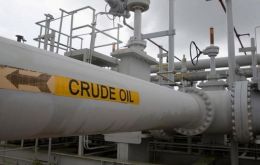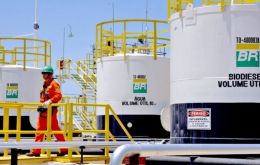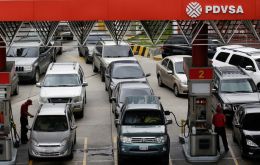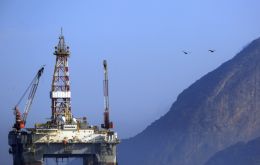MercoPress. South Atlantic News Agency
Tag: oil production
-
Friday, January 24th 2020 - 08:44 UTC
Record oil production in Brazil during 2019

By Irina Slav for Oilprice.com – Brazil produced more than 1 billion barrels last year, the first time it has breached the 1-billion-barrel mark, according to reports from the country’s oil regulator, ANP. The daily average stood at 3.106 million bpd, up 7.78% on 2018, ANP also said.
-
Thursday, December 26th 2019 - 11:49 UTC
Saudi Arabia and Kuwait agree to resume oil production in the shared Neutral Zone

Saudi ARAMCO said on Wednesday a new agreement between Saudi Arabia and Kuwait paves the way for the resumption of oil production in the Neutral (partitioned) Zone shared by the two countries.
-
Thursday, November 7th 2019 - 09:43 UTC
Brazil's oil fields auction falls well short of expectations: US$ 17bn instead of US$ 26bn targeted

Brazil's auction of drilling rights to four deep-sea oil fields raised a disappointing US$17 billion on Wednesday, officials said, well short of expectations for the highly-anticipated mega sale.
-
Saturday, May 11th 2019 - 08:31 UTC
YPF focusing on shale oil to increase production growth

YPF, the largest oil and natural gas producer in Argentina, is focusing on shale oil for production growth as a glut slows natural gas output, managers at the state-backed company said Friday.
-
Monday, May 6th 2019 - 09:30 UTC
Petrobras oil production fell 3.5% during the first quarter compared to a year ago

Petrobras oil production fell 3.5% in the first quarter from the same period a year before, according to Brazil’s oil regulator ANP, which attributed the fall to a number of scheduled and unscheduled stoppages.
-
Saturday, April 6th 2019 - 10:00 UTC
Blackouts hit Venezuela oil output, and clog Orinoco basin tar-oil pipelines

Rolling blackouts across much of Venezuela that started on March 7 paralyzed most of the country’s oil wells and rigs, which have slowly come back online. Oil output averaged less than 600,000 bpd during the blackouts, the people said, who asked not to be identified because the information isn’t public.
-
Friday, March 8th 2019 - 09:11 UTC
Premier Oil reports 2018 profit as a result of record production

UK-based oil and gas firm Premier Oil with interests in the Falkland Islands has announced its full-year results for 2018, reporting a post-tax profit hike to US$ 133.4m as a result of record production. These full-year results are a ‘return to profitability’ from 2017’s full-year loss of US$ 253.8m.
-
Friday, February 22nd 2019 - 09:24 UTC
Brazilian oil production challenges OPEC' attempts to balance the market and prices

While everyone is talking about how surging U.S. crude oil production will offset a large part of the ongoing OPEC/non-OPEC production cuts, there are other oil producers not taking part in the OPEC+ deal and poised to see their output jump this year.
-
Thursday, December 6th 2018 - 09:47 UTC
Venezuela importing 300.000 bpd of refined products to ease fuel shortage

Venezuela this month plans to import over 300,000 barrels per day (bpd) of refined products to ease domestic fuel shortages caused by hobbled refineries and need to prioritize exports, according to internal documents, reports Reuters.
-
Wednesday, December 5th 2018 - 08:39 UTC
Brazil's oil and gas output rose strongly in October after five flat months

Brazil's domestic crude oil output rose for the first time in five months in October as production from the subsalt region continued to grow and fewer floating production units were idled by maintenance shutdowns during the month.
